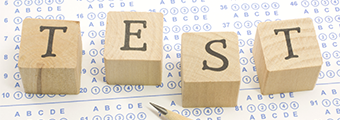What is the fear of getting fat?
Getting fat is a natural mechanism that works in a complex way and is influenced by many factors. Today, it is mostly perceived as something to be avoided. This way of thinking can have serious consequences. Let’s take a look at the fear of gaining weight, its origins, the associated risks and how to deal with it.

Why am I afraid of getting fat?
Self-image is something that is constructed during childhood and adolescence and can continue to change throughout life. It is influenced by many aspects that can strengthen or weaken it.
The family environment is a very important factor in the construction of the self-image. Two aspects come into play here. On the one hand, if these people are particularly concerned about their weight and the idea of being fat, it will be easy for a child to internalise these fears and beliefs and apply them throughout his or her life. On the other hand, the repetition of negative injunctions about weight and being fat in a child can teach the child that their body is not valuable beyond a certain weight or shape, leading to behaviours that will reinforce this fear throughout life.
Society’s beauty standards also play a very important role in self-image and the fear of getting fat. We are constantly bombarded with advertisements for slimming products, presented by people who have no weight to lose, and although representations are beginning to change, film and fashion icons who are considered and presented as ‘sexy’ or ‘attractive’ are mostly thin or skinny. Fatness is often limited to comical or negative roles, as something to get rid of at all costs and with many pejorative connotations: laziness, bad health, etc…
These clichés convey false ideas (studies show that physical activity is a determining factor in terms of health and mortality, independently of weight or BMI) which destroy the self-image of people who perceive themselves as fat, with high levels of stigma and internalized stigma.
Diet and weight are also factors over which it can be easy to exert great control. Being fat is then associated with a loss of control over oneself and one’s body, which can be particularly distressing.
What are the risks of fear of getting fat?
Alone, the fear of getting fat is especially unpleasant, always present in a corner of the head at meal times, snacks, cravings. It is especially dangerous because it is an open door to much more serious problems.
The more the fear of getting fat grows, the more behaviours to avoid getting fat will be put in place. Restrictions, diets, calorie counting, repeated weighing, measuring body shape and form.
These behaviours tend to be repeated and reinforced and can lead to eating disorders, such as anorexia nervosa, bulimia, binge eating or orthorexia.
These disorders can be particularly serious, and falling into these vicious circles often means that the road out is long and difficult. It is important to take care of yourself and your mental health as much as possible so that you don’t end up there.
What to do about the fear of getting fat?
The fear of getting fat is maintained and reinforced by several behaviours and ways of thinking that need to be challenged.
Here are some examples:
- Forbidden foods and restrictive diets. Often, for fear of getting fat, we forbid ourselves sugar, fat, starchy foods, etc. In short, all foods that bring pleasure during eating. These restrictions are very bad because our brain hates them. The restriction works until one day it doesn’t work anymore, and we break down with quantities of food that can make us sick.
No food should be forbidden, no food is bad. Food should be a pleasure. A dietician or a qualified nutritionist will be able to guide you towards a rebalancing of your diet if you think that your diet is not balanced enough, and a psychologist or psychiatrist specialising in eating disorders will be able to help you with bulimic behaviour (which is also reinforced by restriction). - Intensive weighing and measuring. If you are the type of person who weighs yourself every day to keep a close eye on your weight, be careful. These measurements are not representative and can trigger very strong fear patterns. Weight varies enormously throughout the day and week. If you’ve been drinking, eating, going to the toilet, or retaining water, all of these can cause your weight to vary and make you feel like you’ve gained or lost a lot of weight all at once. If you are trying to lose weight for your health (on medical advice), weigh yourself once a week, when you get up, and observe the evolution over several weeks and months. These intensive measurements should also be avoided when it comes to measuring waist circumference, arm circumference, thigh circumference, etc., which can also vary in size due to many factors. Understand why you are having trouble losing weight, and get the beginnings of answers to analyse your problem.
- Avoidance of weighing and mirrors. In contrast to intensive weighing, some people prefer to avoid weighing themselves altogether for fear of gaining weight. Sometimes this can go as far as avoiding one’s reflection in the mirror, for fear of seeing a body part that has grown. These avoidance behaviours reinforce the fear of gaining weight. The anxiety that may be felt at these times cannot last forever. It is important to expose yourself to this gradually if it frightens you in order to tame your fear and realise that there is no risk or danger in weighing yourself or looking at yourself in the mirror. This work should be done in conjunction with work on weight-related beliefs.
- Weight-related beliefs. As mentioned earlier, being fat and getting fat is often associated with many negative automatic thoughts. These thoughts contribute to fear-reinforcing and self-reinforcing behaviours. To counteract them, find counterexamples. With the rise of the body-positive movement, there are now more and more celebrities who embrace their shape and are excellent examples of people whose weight and fatness do not diminish their worth.
In general, fear of gaining weight and body image concerns are issues that can be difficult to deal with. Don’t hesitate to call on a mental health professional to help you through these stages. They will be able to support you in the way that is best for you, with the best tools.
You should also know that new technologies are excellent tools for working on these difficulties. Virtual reality, in particular, can help to reduce body perception bias and restore a healthy and appropriate body image. Coupled with therapy and psychological support, it is a good tool to make your fear of gaining weight disappear.


